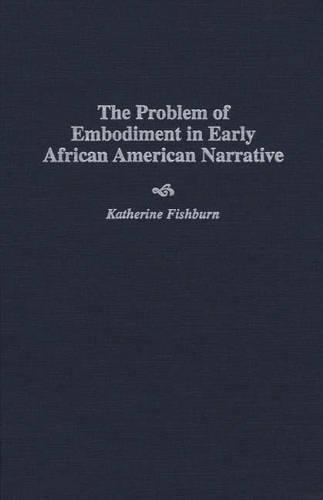
The Problem of Embodiment in Early African American Narrative
(Hardback)
Publishing Details
The Problem of Embodiment in Early African American Narrative
By (Author) Katherine Fishburn
Bloomsbury Publishing PLC
Praeger Publishers Inc
30th June 1997
United States
Classifications
Tertiary Education
Non Fiction
Literary studies: fiction, novelists and prose writers
Ethnic studies / Ethnicity
813.409896073
Physical Properties
Hardback
216
Description
Offering a revolutionary way of reading 19th-century slave narratives, Fishburn seeks to recover the philosophical foundations of African American literature. Underlying slave narrative is an expression of the problem of physical embodiment; that is, the dualistic thinking of the mind-body division. Fishburn's work uncovers the tension between needing to acknowledge the fact of human embodiment and wishing to overcome its consequences in a racist society. One of the strongest points made by this pioneering work is the controversial claim that these slave narratives offer one of the most telling, if largely overlooked, pre-Heideggerian critiques of liberal humanism ever attempted in the West.
Reviews
"Offering a fresh perspective on the cultural politics that shape our understanding of 19th-century African American literary production, The Problem of Embodiment in Early African American Narrative argues that the body knows its needs, and that it expresses that knowledge in a number of ways. The body (especially the 19th-century Black body) is also shaped and produced by culture, so that "it" knows the world we have created better than "we" do. This study looks to rejoin the "it" of the body to the "we" of our understanding, not merely our conscious awareness but also our grounds for philosophy.... This controversial thesis will shake up many of the standard approaches to these texts, to good effect."-John Ernest Assistant Professor University of New Hampshire
Focusing primarily on concepts of Maurice Merleau-Ponty, the author presents an impressive range of Eurocentric theory to explicate five slave narratives, illustrating ways in which each argues from a philosophical standpoint for the notion of human connectedness.-Choice
"Focusing primarily on concepts of Maurice Merleau-Ponty, the author presents an impressive range of Eurocentric theory to explicate five slave narratives, illustrating ways in which each argues from a philosophical standpoint for the notion of human connectedness."-Choice
Author Bio
KATHERINE FISHBURN is Professor of English at Michigan State University, where she teaches courses in African American literature, twentieth-century literature, women's literature, and cultural studies. She is author of a book on Richard Wright, a monograph on Doris Lessing, and three Greenwood Press titles: Reading Buchi Emecheta: Cross-Cultural Conversations (1995), The Unexpected Universe of Doris Lessing: A Study in Narrative Technique (1985), and Women in Popular Culture: A Reference Guide (1982).
